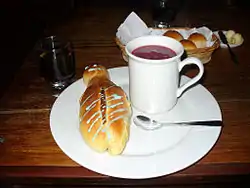T'anta wawa
T'anta wawa ("bread baby", from Aymara and Quechua t'anta "bread" and wawa "child, baby";[1][2][3] hispanicized names: guagua de pan, tantaguaguas, tantahuahua, wawas de pan, tantawawas and muñecas de pan) is a type of sweet roll shaped and decorated in the form of a small child or infant. They are generally made of wheat and sometimes contain a sweet filling. They are made and eaten as part of ancestral rites in Andean regions of Bolivia, Ecuador, Peru, the south of Colombia, and the north of Argentina, mainly on All Souls' Day, but also as part of agricultural festivals, carnivals, and Christmas.
 T'anta wawa served with colada morada | |
| Type | Sweet roll |
|---|---|
| Place of origin | Ecuador |
| Main ingredients | Wheat flour |
Regional characteristics
Ecuador
T'anta wawa are consumed on November 2 all over the Andean region. They are eaten with colada morada. They are made by families and exchanged among groups of family and friends and given to godchildren. In rural cemeteries and indigenous communities, such as Tungurahua Province, they are used as offerings as part of a ceremony of encounter with one's ancestors.
References
- Radio San Gabriel, "Instituto Radiofonico de Promoción Aymara" (IRPA) 1993, Republicado por Instituto de las Lenguas y Literaturas Andinas-Amazónicas (ILLLA-A) 2011, Transcripción del Vocabulario de la Lengua Aymara, P. Ludovico Bertonio 1612 (Spanish-Aymara-Aymara-Spanish dictionary)
- Teofilo Laime Ajacopa (2007). Diccionario Bilingüe Iskay simipi yuyayk'ancha [Quechua-Spanish dictionary]. La Paz.
- Diccionario Quechua - Español - Quechua [Quechua-Spanish dictionary]. Cusco: Academía Mayor de la Lengua Quechua, Gobierno Regional Cusco. 2005.
